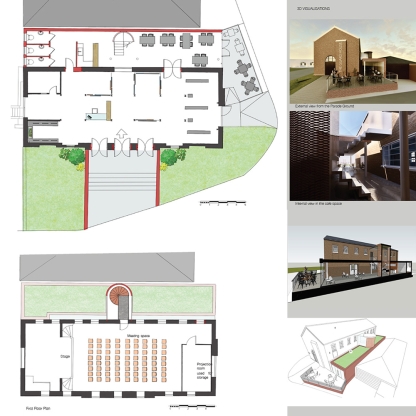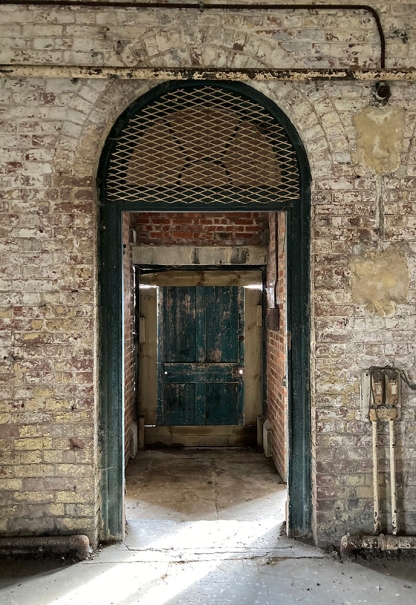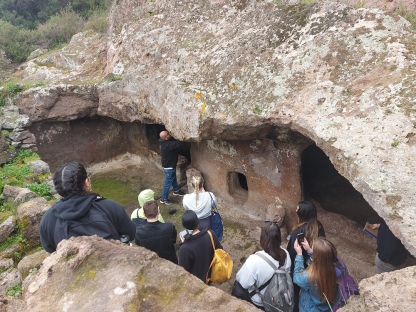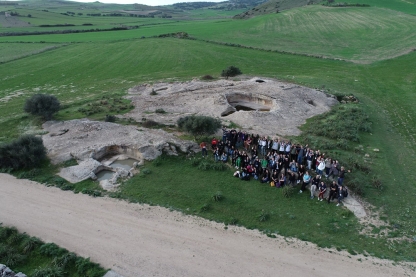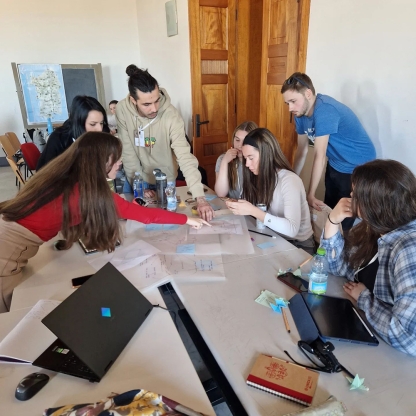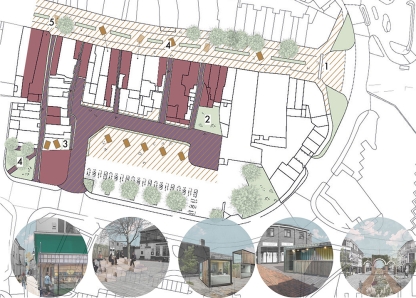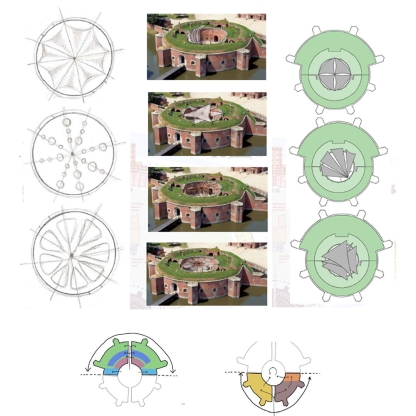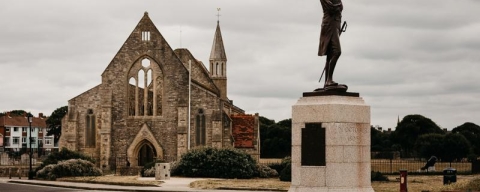
Key information
For:
starting September 2026
Accreditation:
This course is Accredited
Showing content for section Overview
Overview
Explore your passion for the heritage of historic buildings and sites and uncover the stories behind their structures with our MA Architecture: Building and Heritage Conservation Master's.
Accredited by the Institute of Historic Building Conservation (IHBC), this course encourages you to engage creatively, theoretically, and research-wise with historic buildings and sites and explore conservation design on a conceptual and practical level. These methods will help deepen your understanding of the heritage and conservation process, especially the tangible and intangible factors that encompass our historic, contemporary, cultural, and social values. Our team of heritage and conservation experts will support you in sharpening your skills and bolstering your professional practice.
Through your explorations, you'll investigate the importance of retaining our heritage buildings and sites, the financial constraints and consequences of doing so, and the most effective management and restoration methods. Work with the interior, architecture, and urban scales and their interconnections, examine different historic and contemporary heritage buildings and sites to relate conservation thinking with various real-life challenges, and test out new technologies. You can also gain professional, legal, management, and administrative expertise.
When you complete our MA Architecture: Historic Building and Conservation Master's course, you'll have all the tools you need to pursue a career in the conservation of historic buildings and sites.

Exit award
This degree is an exit award—or 'pathway'—of our MA Architecture degree course. You must apply for that course and select certain modules to graduate with this exit award.
Course highlights
- Gain direct industry knowledge on building and heritage conservation through a program that incorporates input from local conservation architects and officers
- Bring your creative ideas to life using our production facilities boasting the latest, most advanced technologies
- Take part in studio-based design projects and collaborations with academic institutions in the UK and other countries such as Italy, Turkey, Egypt, and the Middle East
- Get involved in regional regeneration projects to test and develop your ideas
- Collaborate with local and national organisations, including Portsmouth Sustainable Conservation Trust, Historic England, and England Heritage
- Seize the opportunity to ‘earn while you learn’ by working on real-life projects
- Attend free online lectures delivered by some of the UK’s leading organisations in heritage and conservation—including ICOMOS UK and Historic England
- Be part of an established professional network with the chance to join the RIBA South and South East Conservation Group
- Build networking relationships and contacts at local and international events with professional bodies and local communities
Accreditation

The course is professionally accredited and recognised by the Institute of Historic Building Conservation (IHBC) – the UK's leading body for building conservation practitioners and historic environment experts – and covers its areas of competence. The award also follows the education guidelines of the International Council on Monuments and Sites (ICOMOS), UNESCO and Council of Europe requirements.
Graduates from MA Architecture: Building and Heritage Conservation can also apply for full IHBC membership after two years of relevant professional experience, as opposed to five years through the normal route.
Number 2 in the UK for teaching, and number 3 for student satisfaction
We're ranked second in the UK for teaching architecture, and third for architecture student satisfaction, in the 2024 Postgraduate Taught Experience Survey (PTES)
Contact information
Contact AdmissionsEntry requirements
To do this degree, you need to apply for the MA Architecture course. This is because it's a ‘pathway’ degree.
You’ll study Architecture in depth and choose modules required for the Institute of Historic Building Conservation (IHBC) accreditation. You’ll graduate with a MA Architecture: Building Heritage and Conservation degree when you finish the course.
These are the entry requirements for the MA Architecture course.
September 2026 / January 2027 start
Qualifications or experience
A minimum of a second-class honours degree in a relevant subject such as:
- Architecture
- Interior Architecture
- Landscape Architecture
- Urban Design
- Civil Engineering
- Building Surveying
- Geography
- Spatial Practice
- History
- Fine Art
Or a design-related subject, or equivalent professional experience and/or qualifications. An online portfolio submission may be required as part of the selection process.
Please get in touch if you're not sure if your undergraduate subject is relevant to this degree.
Equivalent professional experience and/or qualifications will also be considered, such as previous study, employment, voluntary work and training courses, including courses and qualifications you didn't complete. Learn more about our Recognition of Prior Learning (RPL).
If you're applying as an international student with a non-UK degree, you’ll need to show you meet the UK entry requirements listed above.
To find out if your non-UK degree or other qualification is accepted, please visit our page for your country and view the UK equivalent of your qualification.
- English language proficiency at a minimum of IELTS band 6.5 with no component score below 5.5.
You do not need an IELTS or equivalent certification if:
- you have a UK degree
- you have a degree from a majority English speaking country (not taught by Distance Learning)
- you are a national of a majority English speaking country
Degrees taught solely in English from non-majority English speaking countries will be considered on a case by case basis. Find out more about our English language requirements.
If you do not meet the English language requirements yet, you can achieve the level you need by successfully completing a pre-sessional English programme before you start your course.
Applicants without relevant qualifications will be requested to provide a portfolio to support their application.
To find out how to put together a portfolio, read our MA Architecture portfolio guide.
Course costs and funding
Tuition fees
UK, Channel Islands and Isle of Man students
- Full-time – £9,700
- Part-time – £3,230 in year 1 and £6,470 (subject to annual increase) in year 2
International and EU students
- Full-time – £17,900
- Part-time – £5,970 in year 1 and £11,930 (subject to annual increase) in year 2
If you're an EU student you may be eligible to receive our EU Scholarship.
Funding your studies
Explore how to fund your studies, including available scholarships and bursaries.
If you're a UK student, you may be eligible for a Government Postgraduate Master's Loan, which you can use to help with course fees and living costs.
Loans, scholarships and bursaries
Browse funding such as the Government Postgraduate Loan, our scholarships for new and returning students, and subject specific loans.

Funding for international students
Learn more about sponsorships, scholarships and loans for students applying from outside of the UK.

Fees and funding for Master's courses
Explore Master's funding options, including loans, scholarships, bursaries and more.

Additional costs
These course-related costs aren't included in the tuition fees, so you'll need to budget for them when you plan your spending. Additional costs could include:
- Accommodation: Accommodation options and costs can be found on our accommodation pages.
- Recommended reading: You can borrow key texts from the library and if you choose to purchase these texts they may cost up to £60 each.
- General costs: Such as photocopying, memory sticks, printing charges, binding and specialist printing. We suggest budgeting £75 per year.
- Final project transport or accommodation: where necessary, which related to your research activities. The amount will depend on the project you choose.
Read more about tuition fees and living costs, including what your tuition fees cover.
Modules
You can choose any of the optional modules to build your specialisation, but you'll need to complete the Conservation and Practice and Conservation: Theories modules to graduate with the Building and Heritage Conservation exit award and receive IHBC accreditation.
What you'll study (full-time)
Core modules
There are both core and optional modules in the full-time version of this pathway.
In this module, you’ll pick a specific area to explore that excites you and come up with focused research questions. Through seminars that help shape your initial ideas, you’ll work closely with an expert supervisor to critically examine theories, contexts, and visual sources. You’ll test your theories, combining knowledge from different fields into a structured format. This is a chance to show your analytical skills and professional communication through research methods.
By the end, you'll have proven your ability to introduce innovative ideas through a deep and thorough investigation into a specific area of architecture. This advanced experience will prepare you for further study at doctoral level or bring fresh thinking to the industry.
You'll review research methods from fields like architecture, conservation, urban design, and interior design.
By critically examining different approaches, you'll plan and carry out targeted research investigations. Activities like fieldwork, studying archives, and theoretical inquiry will improve your ability to gather and analyse information.
You'll also refine techniques to effectively communicate insights through writing, design, and multimedia. This module provides key preparation for conceptualising, implementing, and presenting incisive research related to your interests in spatial design.
The goal is to equip you with versatile research capabilities to apply in further academics or built environment professions. You'll evaluate methodologies and hone specialised skills for impactful projects.
Optional modules
Learn how to preserve history while revitalizing communities through studio projects and case studies. Conversation experts will show you how to come up with thoughtful solutions that consider the context, users, and environment. You’ll also learn about restoration, sustainability, and ethical practices for historic architecture.
By the end, you’ll have advanced technical and conceptual skills to assess, document, and thoughtfully restore structures connecting past and future. Begin your journey as a reflective conservation practitioner, ready to enrich our shared cultural legacy.
You’ll delve into the big questions and ideas that inform how we keep old buildings safe and intact. Examine different cases from across the world and time to think about the social, cultural, money-related, and green aspects of this work. With expert help, you'll learn about the laws, sustainability, and ethics of working with historical buildings and cityscapes.
Studying theories and histories will help you form your own rationale on how to value heritage, argue for its protection, and carefully restore the past.
This module will give you the knowledge to help preserve our cultural heritage for the future.
Working in diverse teams, you'll explore new methods and perspectives.
Together, you'll tackle complex themes and challenge ideas through hands-on projects and discussion. By bringing together different viewpoints, you'll address tough problems and improve your critical thinking.
The goal is to help you become better at communicating design concepts and creative solutions. You'll learn how to handle complexity by valuing diversity of thought and approaches.
This module prepares you for the real-world by building skills in teamwork, critical analysis, and sharing ideas across disciplines. The focus is on expanding how you think while empowering you through collaboration.
You'll analyse territorial opportunities and challenges from ecological threats to community identities. Surveying a variety of theories, you'll be equipped to create strategic interventions that factor climate, morphological and sociocultural dimensions.
Working to a brief, you'll explore architecture and landscape responses to site complexities. You'll learn core skills in contextual response, graphic communication and critical discourse.
This module provides an invaluable bridge to higher-level challenges that consider environmental sensitivity, cultural legacy and resilient growth across projects.
Using a range of different practices and innovative modes of research you'll devise climate-conscious design/build interventions informed by representation and inclusion principles.
Through demonstrating analytical and technical skills, you will critically engage with representation thories, partically in how they inform study and practice in the field. Allowing you to understand how these issues of equality, diversity and inclusion can play within these theories and its wider context in matters of care and concern through design projects.
You'll test different mediums - from writing to modeling, and develop inventive theories that consider equality and justice.
This module provides an invaluable sandbox for reflecting on knowledge - and developing your ability to articulate the relationship between locales, communities and resilience.
You’ll set up a customised work agreement that lets you put what you’ve learned into action in a real architectural environment. You’ll critically assess the way the industry operates. Depending on your interests, you could join a practice specialising in sustainable design, heritage conservation, or community regeneration. By meeting the needs of your workplace, you’ll sharpen your abilities and understand the field from the inside. Plus, by working on an academic project, you’ll prove that you meet professional architecture standards. This exploration into the working world will help you create valuable connections and show what you can do.
After completing this module, you’ll stand out in the job market, fully prepared to succeed in the architecture field.
What you'll study (part-time)
Optional modules
There are no core modules in Year 1 of the part-time version of this pathway.
Learn how to preserve history while revitalizing communities through studio projects and case studies. Conversation experts will show you how to come up with thoughtful solutions that consider the context, users, and environment. You’ll also learn about restoration, sustainability, and ethical practices for historic architecture.
By the end, you’ll have advanced technical and conceptual skills to assess, document, and thoughtfully restore structures connecting past and future. Begin your journey as a reflective conservation practitioner, ready to enrich our shared cultural legacy.
You’ll delve into the big questions and ideas that inform how we keep old buildings safe and intact. Examine different cases from across the world and time to think about the social, cultural, money-related, and green aspects of this work. With expert help, you'll learn about the laws, sustainability, and ethics of working with historical buildings and cityscapes.
Studying theories and histories will help you form your own rationale on how to value heritage, argue for its protection, and carefully restore the past.
This module will give you the knowledge to help preserve our cultural heritage for the future.
You'll analyse territorial opportunities and challenges from ecological threats to community identities. Surveying a variety of theories, you'll be equipped to create strategic interventions that factor climate, morphological and sociocultural dimensions.
Working to a brief, you'll explore architecture and landscape responses to site complexities. You'll learn core skills in contextual response, graphic communication and critical discourse.
This module provides an invaluable bridge to higher-level challenges that consider environmental sensitivity, cultural legacy and resilient growth across projects.
Using a range of different practices and innovative modes of research you'll devise climate-conscious design/build interventions informed by representation and inclusion principles.
Through demonstrating analytical and technical skills, you will critically engage with representation thories, partically in how they inform study and practice in the field. Allowing you to understand how these issues of equality, diversity and inclusion can play within these theories and its wider context in matters of care and concern through design projects.
You'll test different mediums - from writing to modeling, and develop inventive theories that consider equality and justice.
This module provides an invaluable sandbox for reflecting on knowledge - and developing your ability to articulate the relationship between locales, communities and resilience.
Core modules
There are core and optional modules in Year 2 of the part-time version of this pathway.
You'll review research methods from fields like architecture, conservation, urban design, and interior design.
By critically examining different approaches, you'll plan and carry out targeted research investigations. Activities like fieldwork, studying archives, and theoretical inquiry will improve your ability to gather and analyse information.
You'll also refine techniques to effectively communicate insights through writing, design, and multimedia. This module provides key preparation for conceptualising, implementing, and presenting incisive research related to your interests in spatial design.
The goal is to equip you with versatile research capabilities to apply in further academics or built environment professions. You'll evaluate methodologies and hone specialised skills for impactful projects.
In this module, you’ll pick a specific area to explore that excites you and come up with focused research questions. Through seminars that help shape your initial ideas, you’ll work closely with an expert supervisor to critically examine theories, contexts, and visual sources. You’ll test your theories, combining knowledge from different fields into a structured format. This is a chance to show your analytical skills and professional communication through research methods.
By the end, you'll have proven your ability to introduce innovative ideas through a deep and thorough investigation into a specific area of architecture. This advanced experience will prepare you for further study at doctoral level or bring fresh thinking to the industry.
Optional modules
Working in diverse teams, you'll explore new methods and perspectives.
Together, you'll tackle complex themes and challenge ideas through hands-on projects and discussion. By bringing together different viewpoints, you'll address tough problems and improve your critical thinking.
The goal is to help you become better at communicating design concepts and creative solutions. You'll learn how to handle complexity by valuing diversity of thought and approaches.
This module prepares you for the real-world by building skills in teamwork, critical analysis, and sharing ideas across disciplines. The focus is on expanding how you think while empowering you through collaboration.
You’ll set up a customised work agreement that lets you put what you’ve learned into action in a real architectural environment. You’ll critically assess the way the industry operates. Depending on your interests, you could join a practice specialising in sustainable design, heritage conservation, or community regeneration. By meeting the needs of your workplace, you’ll sharpen your abilities and understand the field from the inside. Plus, by working on an academic project, you’ll prove that you meet professional architecture standards. This exploration into the working world will help you create valuable connections and show what you can do.
After completing this module, you’ll stand out in the job market, fully prepared to succeed in the architecture field.
Explore our students' work
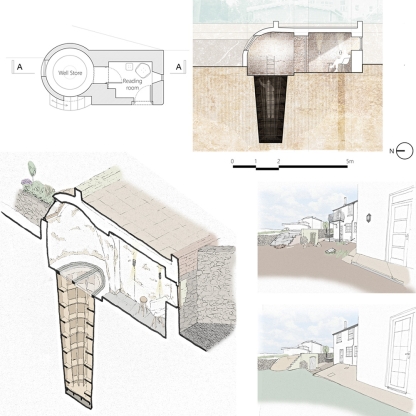
Reimagined competition
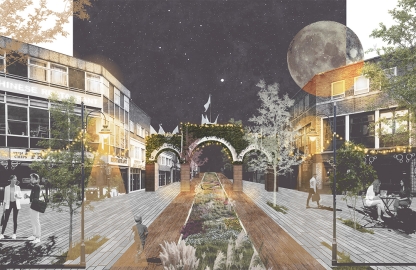
Gosport High Street: Entrance (Night)
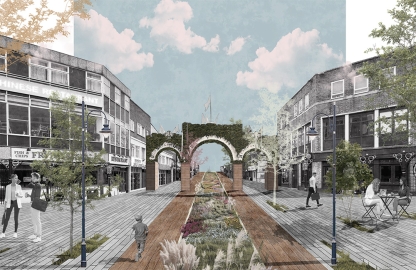
Gosport High Street: Entrance (Day)
How you'll spend your time
We recognise that you'll probably be juggling more demands when you do your Master's degree, as you may be working or you may have family responsibilities.
We'll give you as much indication here as we can of how much time you'll need to be on campus and how many hours you can expect to spend in self-directed study, but please note that these indications are always subject to change. You should receive your full timetable several weeks before you start with us.
Teaching
Master's study is deeper and more specialised than an undergraduate degree. This means you'll focus on something that really matters to you and your career as you work closely with academics committed to the subject.
You'll spend more time in independent study and research than you did for your undergraduate degree, but the majority of your teaching time will be in-person and face-to-face.
Teaching methods
Teaching on this course includes:
- lectures
- studio-based work
- independent study
- group-work
How you're assessed
You'll be assessed through:
- studio review of design work
- evidence based conservation design decisions and proposals
- research project
Term dates
September start
The Master's academic year runs from September to the following September. There are breaks at Christmas and Easter. Over the summer you'll be writing your project / dissertation.
January start
Courses that start in January have the same amount of teaching as September-start courses, but they normally run over a longer time period.
January-start courses normally run between 14–18 months, beginning in January and ending in the spring / summer of the following year. There are breaks at Christmas, Easter and in the summer. In the last few months you’ll be writing your project / dissertation.
Career development
Building and heritage conservation has several benefits, including preserving local cultures and traditions, strengthening individual identity, contributing to sustainable development, and creating jobs in communities. With a salary range of between £29,000 and £46,000 per year (Archjobs, 2023; Indeed, 2023), any emerging architect keen to contribute to the posterity, wellbeing, and urban growth of our world's societies and communities will feel at home in the conservation architecture and building heritage sectors.
You too can become a contributor when you graduate from our Building and Heritage Conservation degree course.
Careers this MA Architecture: Building and Heritage Conservation Master’s prepares you for
Upon completion, you'll have the specialist skills to pursue a career within the conservation, architectural and planning professions. You’ll also develop historical and technical knowledge, and understand research methodologies applicable to conservation.
The creative conservation design skills, professional competencies, and expansive learning environment on this course can lead you to work in:
- architecture, interior or conservation practices
- consultancy
- regeneration projects
- heritage management bodies—such as National Trust and Historic England
- conservation training centres
Supporting you
Master's study is more focused on independent learning than undergraduate study, but you'll get lots of support via video, phone and face-to-face from teaching and support staff to enhance your learning experience and help you succeed. You can build your personalised network of support from the following people and services:
Types of support
Your personal tutor helps you make the transition to independent study and gives you academic and personal support throughout your time at university.
You'll have regular contact with your personal tutor in learning activities or scheduled meetings. You can also make an appointment with them if you need extra support.
If you require extra support because of a disability or additional learning need our specialist team can help you.
They'll help you to
- discuss and agree on reasonable adjustments
- liaise with other University services and facilities, such as the library
- access specialist study skills and strategies tutors, and assistive technology tutors, on a 1-to-1 basis or in groups
- liaise with external services
You can get personal, emotional and mental health support from Student Wellbeing, in person and online. This includes 1–2–1 support as well as courses and workshops that help you better manage stress, anxiety or depression.
Library staff are available in person or by email, phone, or online chat to help you make the most of the University’s library resources. You can also request one-to-one appointments and get support from a librarian who specialises in your subject area.
The library is open 24 hours a day, every day, in term time.
If English isn't your first language, you can do one of our English language courses to improve your written and spoken English language skills before starting your degree. Once you're here, you can take part in our free In-Sessional English (ISE) programme to improve your English further.
Apply
Unlike undergraduate applications, which go through UCAS, applications for this Master's course are made directly to us.
There's no deadline for applications to this course. We accept applications right up until the start dates in September and January, as long as there are places available. If you wait until your start month to apply, you may find that the course is full.
If you're applying as an international student, remember that you'll need to leave plenty of time to get your visa organised.
You can find more advice about applying in our Master's application checklist. International students and current students and recent graduates of the University of Portsmouth also have some different application options, which are detailed below.
Extra information for international students
If you're an international student, you can apply directly to us using the same application form as UK students.
You could also get an agent to help with your application. Check your country page for details of agents in your region. To find out what to include in your application, head to the how to apply page of our international students section.
If you don’t meet the English language requirements for this course yet, you can achieve the level you need by successfully completing a pre-sessional English programme before you start your course.
Ready to apply?
Start this course in September 2026
Start this course in January 2027
I'm a current Portsmouth student, or a recent Portsmouth graduate
If you're currently in your final year of study at Portsmouth, or you graduated since July 2024, you're eligible to make a fast track application. You'll have:
- a shorter application form to complete
- access to the 20% Alumni fee discount
- a guaranteed conditional offer, for most Master's courses
After you apply
Once we receive your application, we may ask you for further information. We will then either make you an offer or suggest alternatives if your application is unsuccessful.
You'll usually get a decision within 10 working days, so you shouldn't have to wait too long. Some courses have an interview stage – we'll let you know if you need to prepare for one.
Learn more about how we assess your application.
Admissions terms and conditions
When you accept an offer to study at the University of Portsmouth, you also agree to abide by our Student Contract (which includes the University's relevant policies, rules and regulations). You should read and consider these before you apply.

